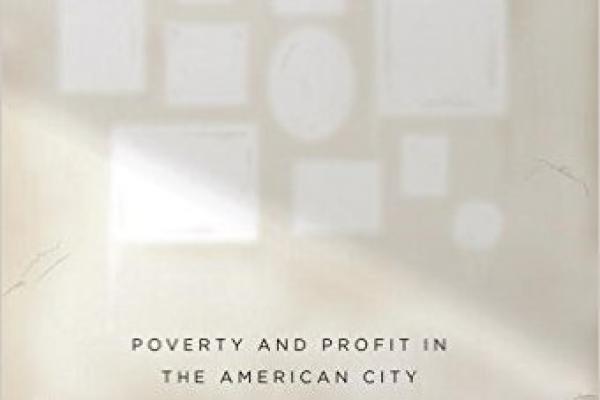OF THE HALF-DOZEN homes that Arleen and her two boys lived in during 2008 and 2009, her favorite was a four-bedroom house on Milwaukee’s North Side. Its exterior was only half painted, and the house was ultimately condemned as unfit for human habitation, forcing Arleen and her sons to move to a shabby apartment in a drug-infested neighborhood. Despite its flaws, as Arleen bounced from one apartment to another, applying nearly her entire monthly income to renting from landlords slow to make repairs but quick to evict, she would long remember that house for its space and relative quiet.
Arleen and her sons are one of the families profiled by Harvard sociologist Matthew Desmond in his masterful, heartbreaking book Evicted: Poverty and Profit in the American City. For his research, Desmond first moved into a trailer park on Milwaukee’s predominately white South Side, and then into a shared apartment on the predominately black North Side. He observed and interviewed people such as Scott, a nurse whose drug habit led him to lose his license and end up sharing a low-rent trailer with a disabled veteran; Lamar, an amputee and father of teenage boys who lived in a dilapidated duplex until a fire destroyed it; and Vanetta, a mother of three who dreamed of an apartment with a bathtub for her kids and a good job, for whom a judgment lapse in a desperate time instead landed her a 15-month prison sentence.
Desmond also shadowed Sherrena and Quentin, owners of numerous low-rent properties around Milwaukee. The couple agreed to this arrangement hoping that people would see “what landlords ... go through.” But they come across less as beleaguered landlords and more as opportunists who fund tropical vacations through a high turnover of low-income renters. They renege on verbal agreements with tenants, postpone desperately needed repairs, and start eviction proceedings when they realize they could get more money by finding new tenants instead of working with the current ones.
By entering into real people’s lives this way, Desmond was not assured of happy endings, and Evicted doesn’t have many. While some featured individuals make choices that worsen their situations, the primary story is one of impossible odds, broken promises, overstretched resources, and systemic racism keeping people in a cycle of eviction that destabilizes families and neighborhoods.
That so many of the featured families maintain hope and fight for their homes, however run down, makes their struggle to get ahead that much more difficult to absorb. Desmond closes with an epilogue that counters hopelessness with practical policy suggestions for helping all low-income renters—not just those who qualify for public housing or Section 8—find and maintain decent housing.
Evicted makes a compelling argument that the lack of affordable, stable, safe housing is the primary problem keeping poor families poor and stuck in unsafe neighborhoods. As rents rise exponentially, families are forced to spend nearly their entire monthly income on substandard housing. Meanwhile, some landlords have realized that they can make good money by spending little on maintenance and repair, while cycling a series of poor families through their properties.
Our homes, Desmond concludes, are not merely shelter; they are “the wellspring of personhood,” the place where we become ourselves. Homes that are broken down, unsafe, and regularly snatched away by a system stacked against poor renters exacerbate problems that go far beyond where a family will sleep tonight.
The poignant stories in Evicted and Desmond’s clear-eyed remedies are perfect reminders that, as Martin Luther King Jr. said, “There is nothing new about poverty. What is new, however, is that we have the resources to get rid of it.” Matthew Desmond eloquently argues that we can help the Arleens, Scotts, Lamars, and Vanettas of our cities get and keep decent housing, and ultimately live more stable, productive lives.
The question, as always when it comes to our response to poverty, is whether we will seriously explore solutions or allow outdated economic models, entrenched prejudice, greed, and failures of compassion and imagination to condemn families like Arleen’s to the dehumanizing pattern of repeat evictions. The stories in Evicted are a haunting plea for us to do the right thing by families who ache for the simple routines that build a life—evening baths in a working tub for the kids, dinner cooked in one’s own kitchen, windows and doors that keep cold and danger out, a place to call home.

Got something to say about what you're reading? We value your feedback!

